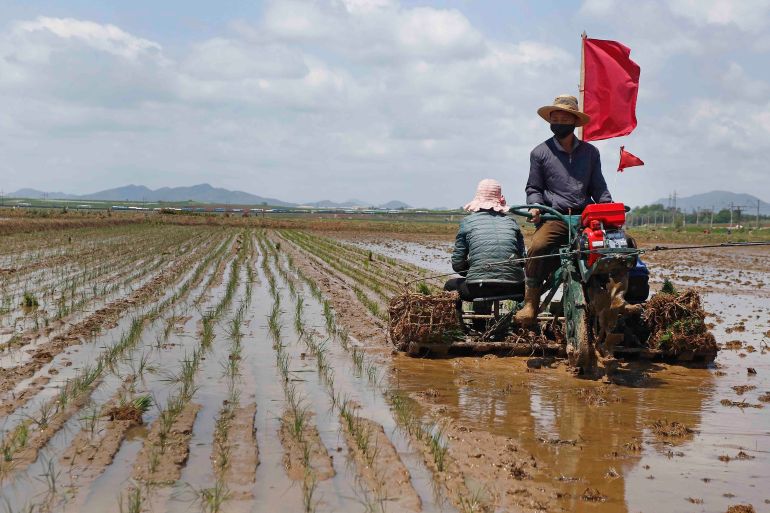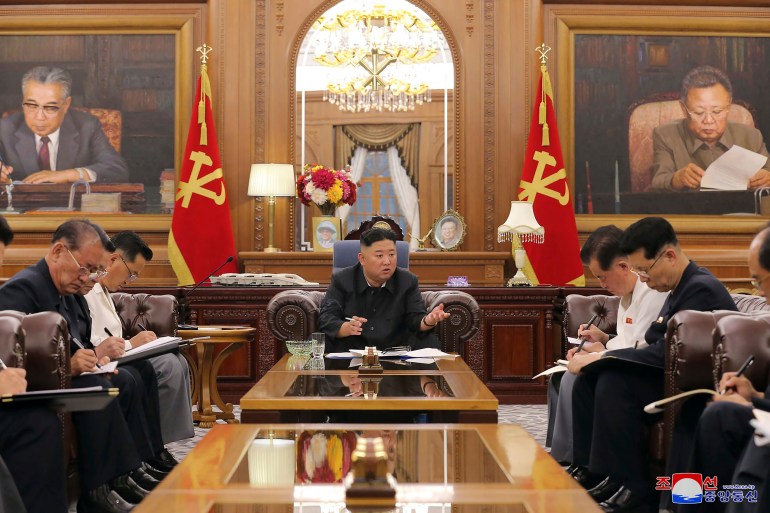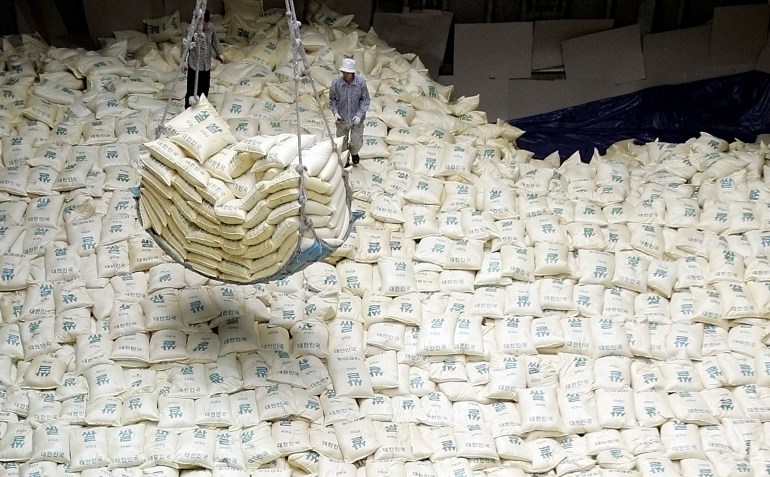Reports of people ‘starving’ as N Korea struggles to feed itself
People in isolated nation reel from impact of sanctions, COVID-19 border closure and extreme weather.

Seoul, South Korea – United Nations Security Council sanctions, the COVID-19 closure of its border with China, and a 2020 drought followed by typhoon rains are combining to create severe food shortages in North Korea, with concerns growing about widespread malnutrition and a potential repeat of the country’s 1990s famine.
North Korean leader Kim Jong Un acknowledged the problem at a June meeting of the Workers’ Party’s Central Committee.
Keep reading
list of 4 itemsSlimmer Kim prompts ‘heartbreak’ in North Korea
Kim’s sister ridicules US’s ‘wrong expectation’ for talks
US envoy offers to meet North Korea ‘anytime, anywhere’
“The people’s food situation is now getting tense,” Kim said according to North Korea’s state media, adding that the agricultural sector had failed to meet its grain production plan because of the damage by last year’s typhoons.
Kim also mentioned the effect of COVID-19.
“It is essential for the whole party and state to concentrate on farming,” the North Korean leader said.
Hazel Smith, an expert in North Korea from SOAS University of London, who spent the best part of 1998 to 2001 inside the country developing agricultural data analysis for UNICEF and the World Food Programme, painted a stark picture of what she knows is happening.
“Children under seven, pregnant and nursing women, the frail, the elderly … these are the people that are starving, right now,” said Smith, whose previous research took her all over the country.
North Korea required 5.2 million tonnes of food for 2020, yet produced only four million tonnes, leaving a shortfall of more than one million tonnes shortfall, the Korea Development Institute in Seoul said in a report last month.
Even with imports, North Korea will suffer a food gap of 780,000 tonnes for 2020-2021, the United Nations Food and Agricultural Organization estimated in a country report in June, outlining the effect of a drought in early 2020, followed by a succession of typhoons and heavy rains in August and September that severely hampered food production.
“If this gap is not adequately covered through commercial imports and/or food aid, households could experience a harsh lean period between August and October 2021,” the FAO said.
The United Nations children’s agency warned of the looming dangers in its most recent update on the country.
In North Korea “10 million people are considered food insecure … 140,000 children under 5 suffer acute malnutrition … and higher rates of malnutrition and mortality are anticipated for 2021,” UNICEF said in its Humanitarian Situation Report published in February.
While nearly all foreign diplomats and relief agencies have now left North Korea, uncorroborated reports suggest the situation is worsening.
“There are so many more beggars, some people died from hunger in the border area,” Human Rights Watch senior researcher Lina Yoon said of an witness account from a missionary working inside North Korea.

Sanctions crippling
Although analysts agreed that the COVID-19 pandemic, which prompted the government to close its China border, has played a significant role in the now chronic food shortfalls, some have argued the source of the problem actually lies in 2017.
The United Nations Security Council imposed sanctions 2375 and 2397 in September and December of 2017, to limit North Korea’s imports of crude oil and refined petroleum products.
Deprived of fuel, farmers have been hindered in planting and harvesting crops and getting their produce to market.
“Agriculture everywhere in the world relies on oil … It’s not rocket science,” SOAS’s Smith told Al Jazeera, outlining what she sees as the primary cause of the potential humanitarian disaster unfolding in North Korea.
“The salient proximate factor [for the food shortage] is the 2017 UN sanctions which prohibited natural gas – and severely restricted oil – going into North Korea,” she said.
North Korea has been subject to increasing sanctions for its nuclear and missile programme since 2006.
But after US President Donald Trump became president of the United States in 2017, he embarked on a maximum pressure campaign, spearheading the Security Council sanctions and implementing unilateral American sanctions, to force the North Korean leadership to give up its missile and nuclear programmes.
The moves did little to slow Pyongyang’s nuclear advance, so Trump switched tack and conducted a number of unprecedented summits with Kim, at which the North Korean leader demanded sanctions relief. The US refusal to agree led to the collapse of the denuclearisation talks.
“The sanctions are not being implemented perfectly but they seem to be serving the basic purpose of pressuring the North Korean authorities by dealing a serious blow to its economy,” researcher Kim Seok-jin of the government-backed Korea Institute for National Unification told South Korea’s Yonhap News.
Smith disagreed.
She said it is the North Korean populace who are really suffering the effect of sanctions.
“They (sanctions) are not affecting the government or the elite … the companies that are engaged in sanctions-busting. They don’t go hungry,” said Smith.

The damage caused by the sanctions has also been exacerbated by the closure of the border with China, as Beijing is responsible for an estimated 90 percent of North Korea’s foreign trade.
After Pyongyang sealed itself off in an attempt to keep out COVID-19, imports from China plunged 81 percent in 2020, according to the East Asia Forum, a Seoul think-tank.
Goods entering North Korea from China are increasingly fertiliser and oil, with medical supplies, household goods and groceries left waiting, Chad O’Carroll, CEO of consultancy KoreaRisk and publisher of NK News, told Al Jazeera.
“I have heard that there are literally thousands of containers stuck in Chinese ports that were meant to go to North Korea that never have. Some of those goods have reached ‘sell by’ dates,” O’Carroll said.
The absence of those imports is thought to have caused havoc in North Korean markets, with the price of a kilo of rice in Pyongyang rising 22 percent in a single week in June, according to Daily NK, a defector-run media outlet based in Seoul. Trade controls have also contributed to a surge in the price of some imported goods – a bottle of shampoo has increased 10-fold, and now costs $200.
Such wild swings, indicating serious problems in the supply chain, are unprecedented under Kim Jong Un, who assumed power in 2011.
“It’s the first time since he’s become leader that we’ve seen such volatility in prices, and there is no end in sight due to the COVID restrictions that is causing these swings,” said O’Carroll, whose NK News works with sources inside North Korea and along the Chinese border.
The price fluctuations have also prompted North Koreans to change their eating habits – replacing rice with corn, which is cheaper, and with the cost of other daily necessities rising, as well, North Koreans are increasingly unhappy, Kwon Tae-jin, director for North Korea at the Northeast Asia Research Center of the Global Strategy Networking Journal Institute, told Al Jazeera.
“If this continues, there could be doubts about Kim Jong Un’s leadership and he will feel political pressure, which he seems to have judged as a threat,” Kwon said.
That pressure may be what prompted Kim to admit there was a problem.
The acknowledgement was “an effort to inform residents and give them a sense of security”, Choi Eunju, a research fellow at the Sejong Institute in Seoul told Al Jazeera.
Amid the COVID-19 restrictions and lockdowns, the few relief groups that were still working in North Korea have almost entirely withdrawn. The last international aid workers belonging to UNICEF and the Red Cross left in December 2020.
The UN has also warned of the effect of the North Korean government’s COVID-19 restrictions – on medicines – particularly vaccines. North Korea now risks running out of polio and tuberculosis jabs with “batches of vaccines stuck on the Chinese side of the border,” UNICEF said in February.
O’Carroll at NK News agreed. “Without a fresh top-up of medical supplies and drugs there is a slow-burn humanitarian disaster probably in the making,” he said.

In the 1990s, the famine in North Korea caused between half a million and three million deaths, a humanitarian disaster brought on by successive droughts and floods, a loss of Soviet support, and economic mismanagement.
SOAS’s Smith conducted perhaps the most detailed analysis of that famine and estimates deaths were probably about half a million. She said that these days – despite North Korea being one of the world’s most isolated countries – outsiders are not entirely ignorant about the situation.
“I am not an alarmist,” Smith said of the current situation, before adding, “We are not in the position of ignorance that we were in the 1990s. We know today exactly what will be happening in North Korea even if we can’t go in and count the blades of grass.”
The real question, she argued, is what to do about the UNSC sanctions and North Korea’s unwillingness to negotiate away its nuclear deterrence.
There exists now a kind of symbiotic relationship between UN member states that are reluctant to admit the sanctions are causing the crisis and North Korea’s policy of self-reliance or “Juche” that makes leader Kim Jong Un reluctant to admit – to his own people or adversaries – that the North requires outside assistance.
It’s “an unholy alliance”, said Smith.
Recognising the security interests preventing immediate sanctions relief, Smith instead recommended a sanctions review, and the sanctions dating from 2017, targeting oil, be immediately suspended, “because we know they’re having an extremely harmful effect on the population as a whole, and the most vulnerable.”
With additional reporting by Jenny Yu.